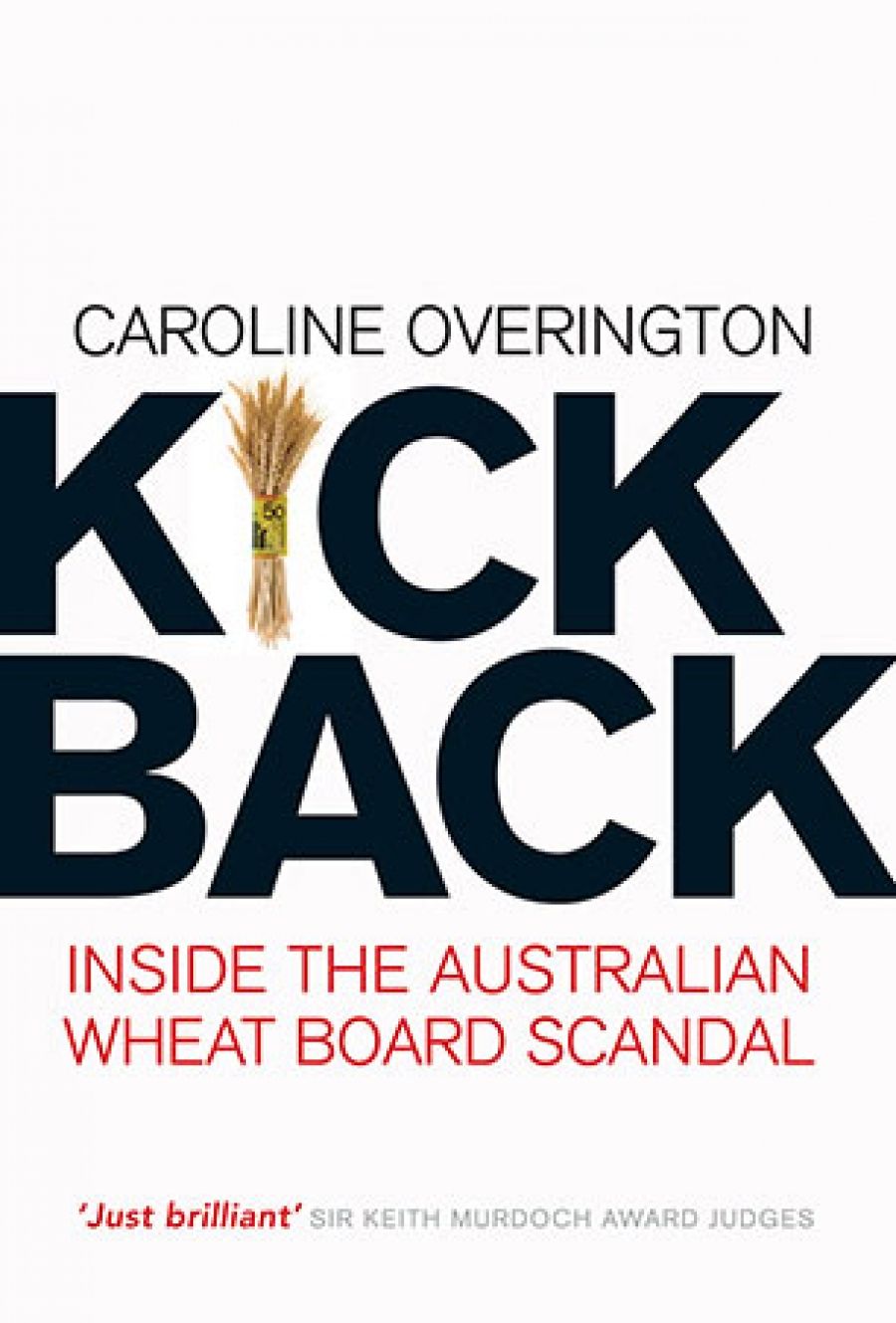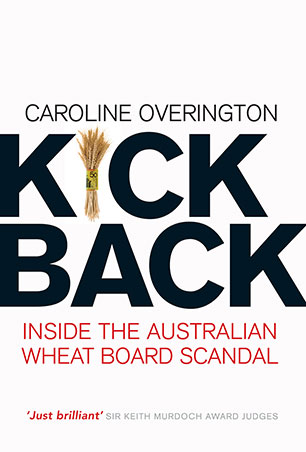
- Free Article: No
- Contents Category: Politics
- Review Article: Yes
- Online Only: No
- Custom Highlight Text:
Perhaps the most enduring memory of the Australian Wheat Board’s Iraq misadventures is the picture of its paunchy former chairman, Trevor Flugge, stripped to the waist and pointing a gun at the camera. Flugge was in Iraq, to all intents and purposes representing Australia. Selected by the Australian government with a tax-free salary package of just under a million dollars, he was there because, in the prime minister’s words ‘our principal concern at the time was to stop American wheat from getting our markets’.
- Book 1 Title: Kickback
- Book 1 Subtitle: Inside the Australian wheat board scandal
- Book 1 Biblio: Allen & Unwin, $26.95 pb. 320 pp
- Book 1 Cover Small (400 x 600):

- Book 1 Cover (800 x 1200):

The AWB had been a government authority until its privatisation in the late 1990s. It controlled the export sales of the Australian wheat crop, which earned about $4 billion a year. Iraq had been a good customer (business is business) and remained so even after UN sanctions were placed on the brutal and belligerent régime of Saddam Hussein. But the sanctions worked too well. Food shortages meant that Iraqis were starving. So the UN set up the ‘oil for food’ programme whereby Iraq could sell oil, provided the proceeds were used only to buy food and medical supplies.
In 1999 the Iraq government introduced new provisions into the contracts with overseas countries supplying grain under the same programme. Henceforth the supplier would be required to pay an extra US$12 per tonne ‘trucking fee’ for transporting the grain within Iraq. Initially, in 1999, the trucking fee for the AWB was about US$7 million. As time passed, the fees were increased from $12 to $45 per tonne, and the total paid in fees amounted to nearly $300 million. The method of payment, of getting the money to Iraq, was through a Jordanian Company, Alia Transportation. It is arguable that the initial fee could have been a genuine trucking charge, which might have been allowed by the UN within the sanctions régime. But as the fee rose and rose, it became clear to even the dumbest of senior AWB personnel that the money was being siphoned off for the purposes of the Iraqi régime.
Should it be paid, and how? Was it in breach of UN sanctions? Should the UN and the Australian government be told about it explicitly and their advice sought? What did the Department of Foreign Affairs and Trade and its ministers know about the AWB’s dealings with a country belonging to the ‘axis of evil’? These were some of the questions that exercised the minds of the senior executives of AWB. But not too much. For some time, these questions floated vaguely in the ether surrounding the AWB, without any serious attempt to answer them. But in 2004 Caroline Overington, then the foreign correspondent in New York for the Age and the Sydney Morning Herald, became interested in possible corruption of the ‘oil for food’ programme. Was the AWB involved? In following up this question, she embarked on a fascinating piece of investigative journalism. In April 2004 her first pieces were published in the two newspapers. From then on, despite some discouragement, including hostile spin from Australian government officials, she persisted, ultimately writing more than one hundred articles, which won her a Walkley Award for investigative journalism. It is work that forms the basis of this informative and engaging book.
American wheat farmers were also interested in the allegations of corruption. Their organisation, US Wheat Associates, was particularly interested in the activities of the AWB. It was this organisation that provided Overington with copies of AWB contracts and suggested the likelihood of bribes being paid to the Iraqis. In 2004 UN Secretary-General Kofi Annan appointed Paul Volcker, the distinguished former chairman of the United States Reserve, to conduct an inquiry. In the same year, a United States Senate Committee proposed an investigation into the wheat trade with Iraq, and particularly the role of AWB. These activities caused nightmares at AWB and some consternation in government circles, which was a little surprising. The relevant government ministers, Alexander Downer and Mark Vaile, seemed to know nothing about it.
In August 2004 some of Volcker’s team went to Iraq and collected information about what had been going on. They were ‘stunned’, according to Overington. ‘It seemed incredible to them that an Australian company – one of America’s few allies in the Iraq war – had been actively funding Saddam’s régime.’ In September, Prime Minister John Howard had some ‘chit chat’ with Volcker about his forthcoming report. At a meeting on September 22, Foreign Minister Downer told Volcker that the AWB was ‘worried about being mentioned’ in his report. Volcker apparently indicated that they had reason to be worried. Downer said that the Department of Foreign Affairs and Trade had conducted ‘a thorough review of its files and found no evidence that AWB had been corrupt’. AWB, he said, had been put in ‘a difficult position’ by the Iraqis. Volcker reminded Downer that there were a couple of ethical choices which AWB had not explored, like refusing to do business with the Iraqi régime or reporting the whole matter to the UN. Downer then tried to warn Volcker off. The scene is embarrassing to think about: a shrewd and tough retired banker and aristocrat of the United States civil service being ‘cautioned’ by Australia’s blustering foreign minister.
The story rolled on, much better told by Overington than by anyone else. In parliament, the Opposition pursued the government with questions about ministers’ lack of knowledge of what their departments, and allegedly their officers, had been told in cables from the UN. There was plenty of material floating about. As early as March 2000, Bronte Moules, from the Australian UN Mission in New York, had cabled Downer and Vaile and various departments about allegations of irregularities in the way AWB was receiving payments from Iraq. Not long after, ‘more than 50 of Australia’s diplomats, officials and bureaucrats in New York, Washington and Canberra had ... been made aware of the “allegations” or “irregularities” in AWB’s contracts’.
But nothing happened. Ministers allegedly knew nothing. Some of them were to say that the UN was to blame. Officials denied responsibility. Later, many of them lost their memories. Kevin Rudd, shadow foreign minister at the time, emerged as the most effective Opposition spokesman on the issue. Corruption in Iraq was to be the making of him.
In October 2005, Prime Minister Howard appointed a retired New South Wales judge Terence Cole QC, to conduct an inquiry into the scandal. The terms of reference were extremely tight. It was to be an inquiry into certain Australian companies in relation to the ‘oil for food’ programme, not an inquiry into the conduct of government ministers or departments. Rudd urged a Royal Commission with power to investigate the government and its ministers. Otherwise it would be ‘little more than a cover up’. Cole insisted that the inquiry be in Sydney, where he lived. This was costly: most of the witnesses and, as it turned out, most of the lawyers were in Melbourne. To observers, Cole seemed arrogant, with, some might say, certain things to be arrogant about, including a prodigious memory for facts.
The ‘Cole Inquiry’ extended well beyond its proposed duration. There were dozens of witnesses and volumes of transcript. Some witnesses told the truth as they had done all along; quite a few told fibs. Vaile and Downer gave evidence and were treated pretty lightly. Howard gave brief evidence and denied any knowledge of corruption. At the Commissioner’s whim, he was not cross-examined.
Andrew Lindberg, the Managing Director of AWB at most or the relevant times and the man who might have had the closest liaison with the government, was found ‘not guilty of any criminal conduct’. Howard, Vaile and Downer were cleared. So, essentially, was the Department of Foreign Affairs and Trade. A task force was appointed by the government to investigate possible breaches of the law by AWB executives. It was given a budget of $25 million. Some sceptics doubt that anything will ever happen. Out of sight, the whole business might soon be out of mind.
It takes a rare talent to turn a story about the overseas wheat trade into a book that can be widely read and enjoyed. Kickback is such a book. The elements of politics, trade, international relations, law, crime fiction and human folly are all here, woven together into a rich and compelling narrative. It is not easy to put down.


Comments powered by CComment